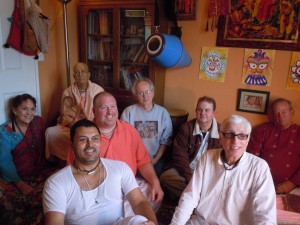680710SB.MON Lectures
viprad dvi-sad-guna-yutad aravinda-nabha-
padaravinda-vimukhat svapacam varistham
manye tad-arpita-mano-vacanehitartha-
pranam punati sa-kulam na tu bhurimanah
So vipra means one who is fully conversant with Vedic knowledge. He is
called vipra. For spiritual elevation there are gradual evolutionary
stages. So vipra stage is just before becoming a qualified brahmana.
That is called vipra. The first stage, by birth everyone is sudra.
Sudra means affected by the miseries of this world. He is sudra.
Socati. The material condition is full of anxiety, so anyone who is
full of anxiety, he is sudra. This is the… So if you analyze the
present society, that who is not anxiety, full of anxiety, oh, nobody
will say that “I am not full of anxiety.” “I have got so many
anxieties.” So that means he is a sudra. Kalau sudra-sambhavah: “In
this age, everyone is sudra.” That is concluded.
A brahmana is not afraid. He is not anxious because he is dependent on God. He knows
that “I have surrendered unto God completely, and He is all-powerful.
Therefore I have no anxiety.”
… So to come to this platform of confidence or Krsna consciousness,
there is training. That training is called viddhi-marga, regulative
principles, following the regulative pinciples. So this whole
varnasrama system, Vedic system, the different caste–brahmana,
ksatriya, vaisya, sudra, a brahmacari, grhastha, vanaprastha,
sannyasa–they are very scientifically designed to elevate one
gradually to the standard of “no fear,” “fearfulnessless,” no more
fear, confident. So vipra means just the previous stage of becoming
completely a brahmana. Janmana jayate sudrah: “By birth everyone is
born a sudra.” Samskarad bhaved dvijah: “When he goes to the spiritual
master and the spiritual master initiates him, at that time his second
birth is there, dvija.” Dvija. The birds are called also dvija because
they get twice birth. Once they come as egg, the form of birth in the
egg, and then, when they come out from the egg and the shell, break
the shell and come out, that is real life. Similarly, we are in the
egg, within the shell of ignorance. So when we come out from the shell
of ignorance, that is our second birth. The first birth is by father
and mother, and the second birth is by the spiritual master and Vedic
knowledge. There is also mother. The Vedic knowledge is mother, and
the spiritual master is the father. So samskarad bhaved dvijah. The
spiritual master trains the student gradually. That is called
initiation. That is called dvija. Janmana jayate sudrah: “By birth by
the father and mother, everyone is sudra.” It doesn’t matter where he
takes his birth, not that only India they are brahmana, ksatriya,
vaisya, sudra. Everywhere.
There are ten kinds of samskaras,reformatory. This Vedic system is very
scientific system to elevate the humankind to the highest perfection of life.
So samskarad bhaved dvijah. Then, when the samskara is given, when his, the spiritual
master sees that “This boy is now competent to study Vedas…” That
requires a qualification. A sudra is not allowed to study Vedas. There
is restriction. Sometimes they think injustice, that “Why sudras?”
That is modern convention. Actually that is very nice. What a sudra
can understand Vedas? To the sudras, a different type of knowledge…
Just like the same thing, that the two plus two in the lower class is
different from the two plus two in the higher mathematics. So sudra
cannot understand. So one has to become brahmana, vipra at least,
dvija, twice-birth by initiation. Then he is allowed to study. Then he
will be able to understand the language of… It is not injustice that
sudras are not… Just like… I do not know what is the system in your country, but in India, one who is not a graduate, he is not allowed to study law. If one, anyone wants to study law, if he wants
to enter into the law college, then he must be a graduate first of
all, at least B.A. Otherwise he cannot. So if somebody says, “It is
injustice,” why? “Everyone should.” Everyone cannot understand.
Similarly, without being intiated by proper spiritual master, nobody
can understand. The Vedas is not like that: you purchase a book, the
Bhagavad-gita or Bhagavata, and study at home, and you learn. Oh, it
is not possible just like simply by purchasing some medical books and
study at home you cannot become a doctor, medical man. That is not
possible. Neither you can become a lawyer. The books are available in
the market, but that is not the process. You have to enter yourself in
an institution, take lessons from the professors, must attend lecture
classes, seventy-five percent at least. Then you are allowed to sit in
the examination.
So the gradual process… First birth is sudra, anyone. It doesn’t
matter. Even if he is born of a brahmana father, he is considered a
sudra. So then, by initiation, he becomes dvija, second birth. Then he
is allowed to study the Vedic literatures, and when he is conversant
with the studies of Vedic literature, he is called vipra. And when one
has become a vipra–because that is the just previous stage of
becoming a brahmana–he acquires twelve kinds of qualities.
Satya-sama-dama-titiksa. The first quality is truthfulness. The second
quality is controlling the senses. Controlling the mind.
Sama-dama-titiksa, to be very tolerant; arjava, very simple; full of
knowledge; full of theism; so many qualities. These qualities are
mentioned. So here Prahlada Maharaja says, viprad dvi-sad-guna-yutat.
When one is a vipra, that means he has got all the good qualities,
material good qualities. He is truthful. He is conversant with the
science of religion. He knows what is God, what is Brahman. He is
self-controlled. He is not sensual. So many good qualities.
770214r2.may
Prabhupada: Kanistha-adhikari (third class devotee) means he must be a brahmana. That is
kanistha-adhikari. The spiritual life, kanistha-adhikari, means he
must be a qualified brahmana. That is kanistha. What is esteemed as
very high position in the material world, brahmana, that is kanistha-adhikari.
The brahmana means from the material stage gradually he is elevated
to the spiritual stage. And below the brahmana there is no question of
Vaisnava.
KB 51 Deliverance of Mucukunda
The Lord then assured King Mucukunda, “In your next life you will
take your birth as a first-class Vaisnava, the best of brahmanas, and
in that life your only business will be to engage yourself in My
transcendental service.” The Vaisnava is a first-class brahmana,
because one who has not acquired the qualification of a bona fide
brahmana cannot come to the platform of a Vaisnava. When one comes to
the platform of a Vaisnava, he is completely engaged in welfare
activities for all living entities. The highest welfare activity for
living entities is the preaching of Krsna consciousness. It is stated
herein that those who are specifically favored by the Lord can become
absolutely Krsna conscious and be engaged in the preaching work of the
Vaisnava philosophy.
KB 52 Krsna, the Ranacora
Reaching the gate of Dvaraka, the brahmana informed the doorkeeper
of his arrival, and the doorkeeper led him to the place where Krsna
was sitting on a golden throne. Since the brahmana had the opportunity
of being Rukmini’s messenger, he was fortunate enough to see the
Supreme Personality of Godhead, Krsna, who is the original cause of
all causes. A brahmana is the spiritual teacher of all the social
divisions. Lord Sri Krsna, in order to teach everyone the Vedic
etiquette of how to respect a brahmana, immediately got up and offered
him His throne. When the brahmana was seated on the golden throne,
Lord Sri Krsna began to worship him exactly in the manner in which the
demigods worship Krsna. In this way, He taught everyone that
worshiping His devotee is more valuable than worshiping Himself.
… Krsna appeared before the brahmana and said, “My dear brahmana, I
hope that you are executing the religious principles without any
difficulty and that your mind is always in a peaceful condition.”
.. A peaceful mind is the basis for becoming truthful, clean, equipoised,
self-controlled and tolerant. Lord Krsna continued: “O best of all the brahmanas, you should
always remain satisfied because if a brahmana is always self-satisfied
he will not deviate from his prescribed duties; and simply by sticking
to one’s prescribed duties, everyone, especially the brahmanas, can
attain the highest perfection of all desires.
..This instruction of Krsna to the brahmana is very significant. The
purport is that a true brahmana should not be disturbed in any
situation. In this modern age of Kali-yuga, the so-called brahmanas
have accepted the abominable position of the sudras or less than
sudras and still want to pass as qualified brahmanas. Actually, a
qualified brahmana always sticks to his own duties and never accepts
those of a sudra or of one less than a sudra. It is advised in the
authorized scriptures that a brahmana may, under awkward
circumstances, accept the profession of a ksatriya or even a vaisya,
but never is he to accept the profession of a sudra. Lord Krsna
declared that a brahmana should never be disturbed by any adverse
conditions of life if he scrupulously sticks to his religious
principles. In conclusion, Lord Sri Krsna said: “I offer My respectful
obeisances to the brahmanas and Vaisnavas, because the brahmanas are
always self-satisfied, and the Vaisnavas are always engaged in actual
welfare activities for the human society. They are the best friends of
the people in general; both are free from false egoism and are always in a peaceful condition of mind.
CONCLUSIONS- Hare Krsna .The above statements are meant to show us the gradual progression to perfection, from a kali yuga sudra who meets a pure devotee such as Srila Prabhupada. These steps begin with hearing from the pure devotee, developing some sraddha or faith in him, taking initiation from him, and then by following the daily regulative principles one become a learned person, or a Vipra. After attaining this stage with further development, one then becomes a fully qualified brahmana and has no anxieties but full confidence in the Personality of Godhead.
Based upon lack of personal qualifications, the sudra typically is not allowed to study the Vedas, not out of prejudice but because that person just has no taste for it. This is due to the infection of the lower modes of passion and ignorance. But when one begins to actually serve the spiritual master,
[One main reason why we chant Hare Krsna] this attitude gives one the taste for studying the Vedas, and then all good qualities develop in that person.
Srila Prabhupada states that a fully qualified brahmana, a very prestigious position in the material world, is still on the material platform. But when this same brahmana begins to preach Krsna Consciousness this distinction gradually takes him out of the material modes of nature and then his activities become completely spiritual or transcendental. (see above)
Finally, Lord Krsna offers His obeisances to the brahmanas and the Vaisnavas. His respect and love for the brahmanas is due to their being self-satisfied (mode of goodness) and for the Vaisnavas due to their caring for the general welfare of all human society.
Hare Krsna
Damaghosa das



